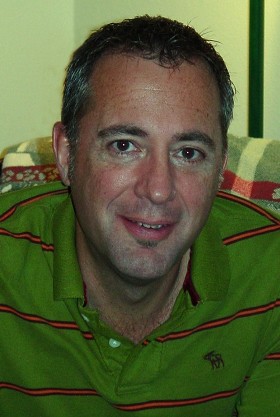11 May 2010
Rich Cline - Media / Arts
As a child what did you want to be when you grew up?
A maths teacher. But a year of university-level calculus put an end to that. I'm thankful that the American liberal arts university degree allows you to change your field of study along the way, while you're covering the basics in a variety of fields. I was "undeclared" for a year until I discovered communication/journalism.
How did you become a film critic?
Being born in Los Angeles, it's perhaps not surprising that I have had a passion for cinema since I was very young. My first movie memory is seeing Snow White at a drive-in and being stunned that something could evoke so many feelings - happiness, terror, exhilaration, uncertainty, and joy. My family moved to Ecuador as missionaries when I was a teen, so I finished school in Quito then returned to California for university. I studied communication theory (with an emphasis in journalism) and took several film courses as part of my four-year degree.
What is the best and worst thing of being a film critic?
The best thing is that it lets me indulge in my passion for the movies, watching most films before I've heard anything about them, so expectations are kept to a minimum. And of course I see them for free. The worst thing is that I have to watch everything through to the end - even bad movies. The other downside is that you only get (usually badly) paid for the words you write, not for all of the hours you spend watching the films.
Best film ever?
My all-time favourite is La Strada, a 1954 drama about a travelling circus by Federico Fellini.
What inspires you in your work?
It's the desire to communicate my passion - for film as well as for the work being done by Alliance members. I also like writing about travel and food!
How do film and story shape society the common good?
A lot is said about how cinema is an escape valve, letting us experience feelings, people and places we can't get in the real world. But I think cinema's best aspect is that it helps us see ourselves in clearer focus. By recognising our own attitudes, actions and feelings in a fictional character (or even in our reaction to the story we're watching), we can take ownership of our own attitudes, actions and feelings, and perhaps make the world a better place as a result.
Which movie character do you most relate to?
It would have to be Luke Skywalker in the original Star Wars trilogy - relentless curiosity, a desire to do whatever he can to improve things, and frustration when he gets it all wrong, which he does rather a lot.
Martin Luther King Jr had a dream for society. What is yours?
It's really the same dream that Dr King had: that we would find the true mind of Christ and actually learn to love our neighbours as ourselves - regardless of their race, economic status, nationality, sexuality, behaviour or religious beliefs.
The 'angry young men' had an impact in the '50s. Is there a new literary movement at the moment?
Sadly, if we're talking about cinema, the angry voices are very few, mainly because the general public just wants to see the same old movie over and over again: something bland and unchallenging with big effects and simplistic characters. The "angry voices" are in the smaller films - foreign-language, independent, documentaries, often without any big name attached. But they're out there if you look. Mainly, what happens now is that the big stars use their celebrity to have an impact off-screen (like Bono and George Clooney).
If not, what would you like to see emerging?
I'd love it if the public developed an interest in more provocative cinema, because then the big studios might start taking a chance again. And if people saw these films, then society's leaders might start to realise that they actually care about the issues. As it is, politicians can get away with whatever they want, really, because they know the public isn't really interested in anything beyond tabloid headlines. This is a generalisation of course, but why else has government become so unresponsive and self-regarding?
What do you invest in the next generation?
Hopefully I can help people be a little more curious about things, looking beneath the surface of the movies they see and demanding more than mindless entertainment. In some ways, this is what I try to do in idea as well, helping members see what's happening in the evangelical world from a slightly different angle than they're used to.
What would you do with a million quid?
I'd probably retire to some isolated beach house and continue writing - still in magazines and online, but also novels. Money would give me the time to explore more passionate projects, and also the ability to support work in areas that I feel are vitally important - mainly justice issues like fair trade, health care and poverty.
What's your most treasured possession?
Memories of people, places and experiences - and of all those films. Well, most of them.
Tell us a joke
Q: How many absurdist/surrealist filmmakers does it take to screw in a light bulb?
A: November.

